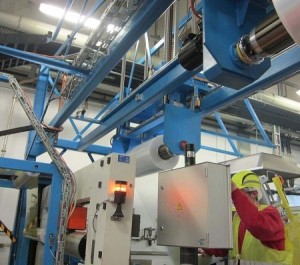Investment sees Linpac Ritterhude reach 100% recycled content
 The installation of a third extruder at LINPAC Ritterhude is enabling the company to deliver products made from up to 100% recycled content for the first time and address the growing demand for PET and rPET in north-west Europe.
The installation of a third extruder at LINPAC Ritterhude is enabling the company to deliver products made from up to 100% recycled content for the first time and address the growing demand for PET and rPET in north-west Europe.
For the past year, the German site has been able to manufacture mono sheet averaging 93 per cent post consumer recyclate (PCR) but the new extruder provides the site with greater capacity and flexibility to manufacture products containing 100 per cent recycled content.
In the past five years, LINPAC has invested €9 million in new plant and equipment at its two German sites, including €3 million on PET extrusion and automation facilities in Ritterhude, in a bid to significantly increase market share in Germany and surrounding countries.
Adam Barnett, managing director for northern Europe at LINPAC, said: “This major investment demonstrates our commitment to an important market for LINPAC. It is vital that, as the German market continues its shift from PP towards PET, we are able to meet growing customer demand for products which are lighter, cheaper and more sustainable.
“The installation of the new extruder in Ritterhude extends our capabilities greatly and being able to manufacture using 100 per cent post consumer recyclate is a major breakthrough for LINPAC in north-west Europe. It will enable us to offer a wider variety of products to customers to ensure they receive the best packaging for their application.”
PET and rPET is becoming increasingly popular as a packaging material across Europe due to its versatility, lightweight nature, barrier and food safe properties, as well as its recyclability.
LINPAC has invested heavily in its in-house supercleaning technology to ensure its rPET meets the most stringent food safety and hygiene regulations for food packaging. The technical committee of the European Food Safety Authority (EFSA) vetted and approved the processes employed by LINPAC in 2013, saying that products manufactured by the company did not give rise to concern for a risk to human health, even when made using 100 per cent PCR.
All suppliers of post-consumer flake sourced by LINPAC undergo a rigorous approval process to meet EFSA standards. In addition, the company carries out extraction and migration testing regularly to ensure processes are exceeding European food safety standards with packs using 100 per cent PCR.
Mr Barnett added: “As the trend towards the use of recycled plastics in food packaging grows, the challenge for plastics processors supplying the industry is ensuring that the recycled plastic is suitable for food use and free from contamination. Our customers can have complete peace of mind when choosing LINPAC rPET that this is the case. The entire structure is food safe, visible, controlled and challenged.
“Retailers and consumers are driving growth in the rPET market with demand for packaging which has strong environmental credentials; rPET is easily recycled and reduces carbon footprint by up to 70 per cent when compared to virgin PET. Furthermore, it offers a high quality, crystal clear material with no discolouration, boosting pack presentation for on-shelf appeal.”
LINPAC delivers plastic packaging to the protein, bakery, fruit & produce and food service markets from its network of sales offices and factories throughout Europe. Its global headquarters is located in Featherstone, West Yorkshire.

































